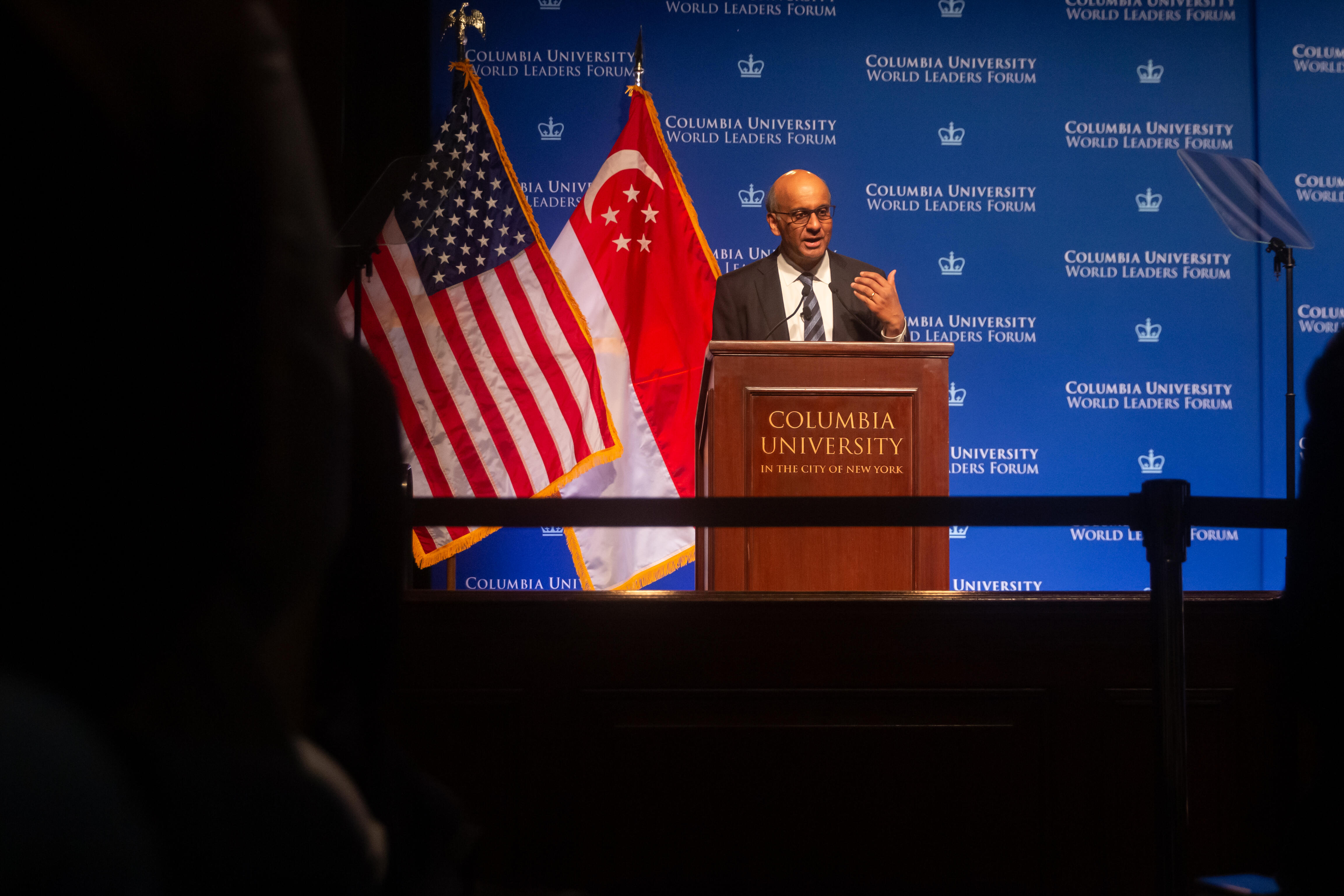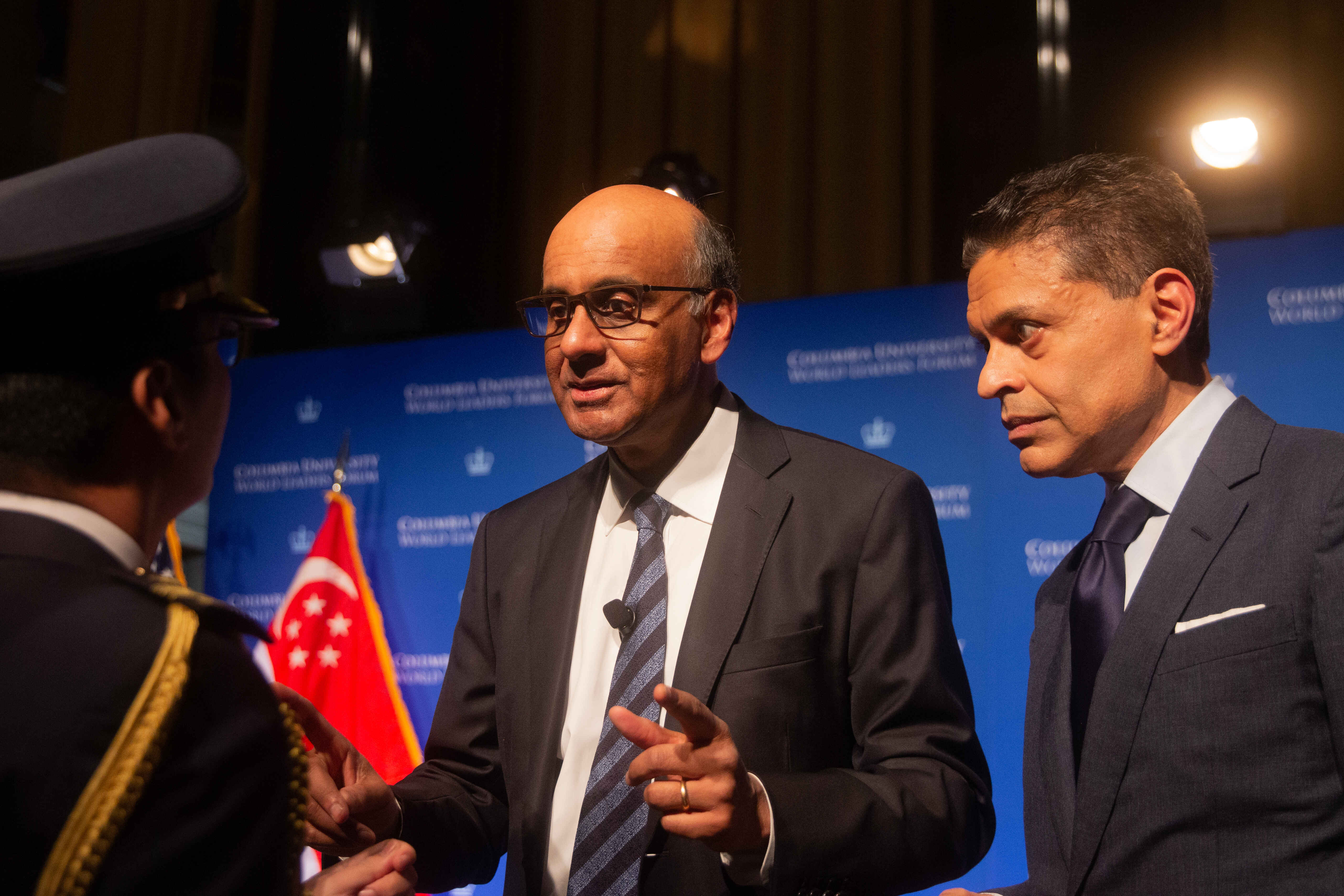新加坡总统尚达曼在 SIPA 的加布里埃尔·西尔弗纪念讲座上讨论全球合作
https://www.columbiaspectator.com/news/2023/11/28/president-of-the-republic-of-singapore-tharman-shanmugaratnam-discuss-global-collaboration-at-sipas-gabriel-silver-memorial- 演讲/
国际与公共事务学院的加布里埃尔·西尔弗纪念讲座成立于 1949 年,旨在促进更大的国际理解和世界和平。
作者:丹妮拉·奥斯皮诺·帕拉雷斯 • 2023 年 11 月 28 日
周二,世界领导人论坛在低图书馆圆形大厅举行了新加坡共和国总统尚达曼与 CNN 主持人、《华盛顿邮报》专栏作家法里德·扎卡里亚之间的对话。
此次活动题为“建立共同点”,由国际与公共事务学院全球政治研究所共同主办,是 SIPA 加布里埃尔·西尔弗纪念讲座系列的一部分。 据 WLF 网站称,该讲座成立于 1949 年,“目的是为了促进更多的国际理解和世界和平”。
大学校长米努什·沙菲克在介绍性发言中表示:“我们应该期待一位非常杰出的记者和一位长期任职的公务员和政治家之间就韧性、乐观和尊重进行深思熟虑和深入的对话。”
在整个活动中,尚穆加拉特南强调,迫切需要通过促进各国之间的合作来积极应对全球挑战,而不是仅仅在问题出现时做出反应。
尚穆加拉特南在介绍性演讲中表示:“我们确实必须正视我们所处世界中强大的、破坏稳定的暗流——地缘政治、生态和社会。我们只是在等待一场又一场危机的到来。”
尚穆加拉南呼吁各国之间建立更深层次的尊重和团结文化。
他说:“我们必须找到方法,让世界各地的领导人将和平视为本国人民利益的关键,并认为只有承认并尊重对方的需求,和平才有可能实现。”
CNN 主持人法里德·扎卡里亚 (Fareed Zakaria) 也加入了 Shanmugaratnam 的行列。 Shanmugaratnam 还讨论了增加对突破性气候可持续性技术投资的必要性。
“为了拥有更美好的未来,你今天要付出代价,”他指的是应对气候变化的旧战略。 “今天的可持续发展需要做出一些牺牲。 那是旧的想法。 我们现在知道,如果我们投资新的解决方案、新技术,就没有真正的权衡。”
他认为,这些技术进步对于避免未来十五年地球系统出现临界点是不可或缺的。
尚穆加拉特南表示:“这种转型需要在较长时期内进行更高水平的投资。”
正如尚穆加拉特南所描述的那样,大部分谈话都围绕着“基于规则的秩序”的持续侵蚀。 扎卡里亚在讲话中强调,有必要维持一个不陷入两极分化的多极世界。
“解决方案似乎是美国本质上使用硬实力来威慑、打击、扭转这些破坏国际秩序的努力,”扎卡里亚说。 “但这样做会进一步分裂世界。 它迫使各国选边站队。 ……你怎么穿这根针?”
尚穆加拉南表示,推动国际两极分化需要集体组织。
他说:“我想说,要从各国的情况出发,着眼于他们的需求,并找到多边组织方式或通过联盟来满足这些需求。”
SIPA 院长 Keren Yarhi-Milo 发表了闭幕词,回顾了此次对话及其与系列讲座“促进国际理解与世界和平”承诺的相关性。
亚里-米洛说:“在像今晚这样的对话中,真正可以看出的是我们生活在一个不确定的时代。” “我们需要更多像今天的客人一样的领导人,致力于建立更具包容性的社会契约、激励年轻人、反对两极分化的领导人。”
President of the Republic of Singapore Tharman Shanmugaratnam discusses global collaboration at SIPA's Gabriel Silver Memorial Lecture
https://www.columbiaspectator.com/news/2023/11/28/president-of-the-republic-of-singapore-tharman-shanmugaratnam-discuss-global-collaboration-at-sipas-gabriel-silver-memorial-lecture/

The School of International and Public Affairs's Gabriel Silver Memorial Lecture was established in 1949 “to foster greater international understanding and world peace.”
The World Leaders Forum on Tuesday hosted a dialogue between Tharman Shanmugaratnam, president of the Republic of Singapore, and Fareed Zakaria, CNN host and the Washington Post columnist, in the Low Library Rotunda.
The event, titled “Building Common Ground,” was cosponsored by the School of International and Public Affairs’ Institute of Global Politics and held as part of the Gabriel Silver Memorial Lecture series at SIPA. The lecture was established in 1949 “to foster greater international understanding and world peace,” according to the WLF website.
"We should expect a thoughtful and incisive conversation about resilience, optimism, and respect between a very distinguished journalist and a long-time public servant and politician,” University President Minouche Shafik said during her introductory remarks.
Throughout the event, Shanmugaratnam emphasized the critical need to proactively address global challenges by fostering collaboration among nations, rather than merely reacting to them as they arise.
"We do have to look at the powerful, destabilizing undercurrents in the world we are in—geopolitical, ecological, and social,” Shanmugaratnam said during his introductory speech. “We are just waiting for one crisis after another to come.”
Shanmugaratnam called for a deeper culture of respect and unity among nations.
"We have to find ways in which around the world, leaders see peace as essential to the interests of their own people and see peace only possible if you acknowledge and respect what the other side needs,” he said.

Shanmugaratnam was joined by CNN host Fareed Zakaria. Shanmugaratnam also discussed the need for increased investment in breakthrough climate sustainability technologies.
“You pay a cost today in order to have a better future,” he said, referring to the old strategies of combating climate change. “Sustainability requires sacrificing something today. That was the old thinking. We now know that there is no true tradeoff if we invest in new solutions, new technologies.”
These technological advancements, he argued, are indispensable in avoiding tipping points in the earth system within the next decade and a half.
“That transition story requires higher levels of investment over a longer period of time,” Shanmugaratnam said.
Much of the conversation revolved around the continual erosion of a “rules-based order,” as Shanmugaratnam described it. Zakaria, in his remarks, emphasized the necessity of maintaining a multipolar world that does not devolve into polarization.
“The solution seems to be that the United States essentially uses hard power to deter, combat, reverse these efforts to fray the international order,” Zakaria said. “But in doing that, it divides the world more. It forces countries to pick sides. … How do you thread this needle?”
Shanmugaratnam said this push against international polarization requires collective organization.
“I would say start from where countries are, look at their needs, and find ways of organizing ourselves multilaterally, or through coalitions to address those needs,” he said.
SIPA Dean Keren Yarhi-Milo delivered the closing remarks, reflecting on the conversation and its relevance to the lecture series’ commitment to “fostering international understanding and world peace.”
“What really can come through in conversations like this evening’s is that we are living in uncertain times,” Yarhi-Milo said. “We need more leaders like our guests today, leaders committed to building more inclusive social compacts, lifting up young people, and opposing polarization.”






